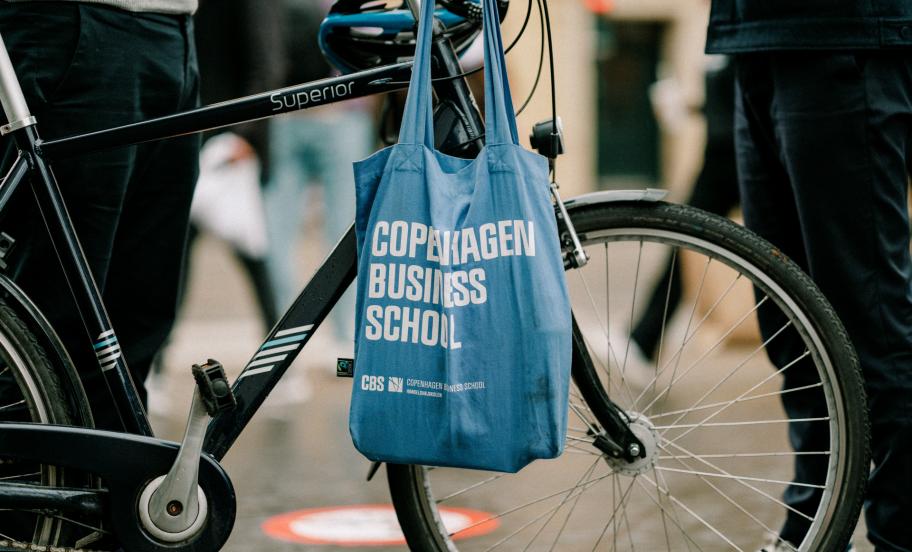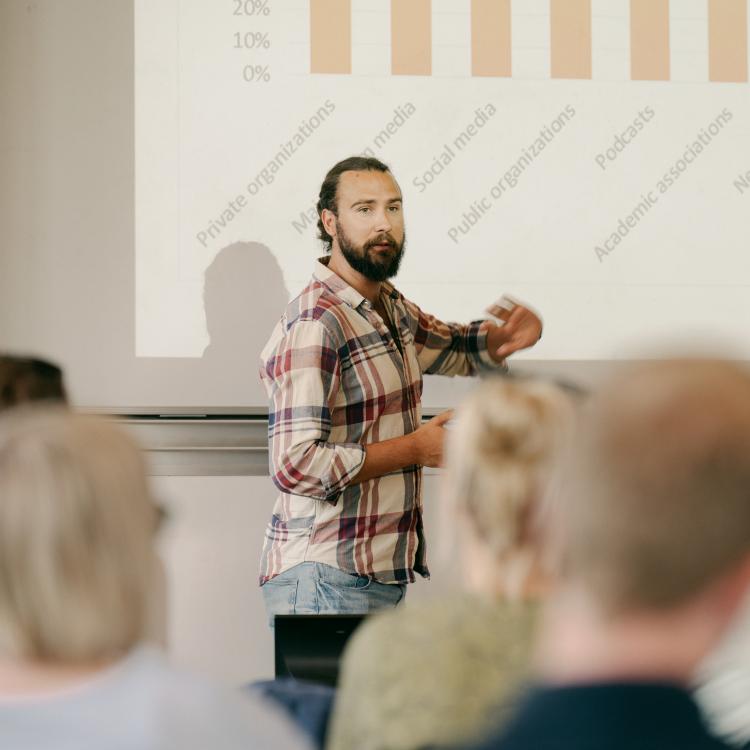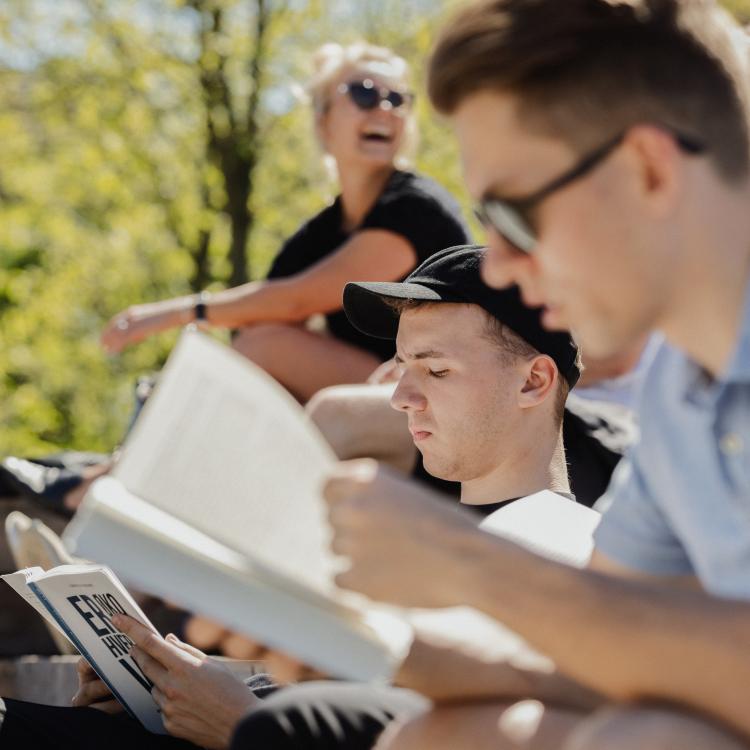Structure and options
Learn how the study programmes at CBS are structured and explore the various opportunities you have during your time at CBS, like doing an internship or going on exchange.
Bachelor programmes
What is a bachelor programme? (Panel content)
What is a bachelor programme?
A bachelor programme consists of 180 ECTS and takes three years to complete. You gain a solid foundation within a specific subject area and learn to work independently with theory, analyses and real-world challenges.
Create your own profile
The bachelor programme is made up of a range of compulsory courses. During the programme, you have several opportunities to shape your own academic profile. For example, you can choose elective courses that match your interests, go on exchange or do an internship.
Overview of the programme (Panel content)
1st semester
2nd semester
3rd semester
4th semester
5th semester
6th semester
Options during the programme (Panel content)
During your bachelor’s programme, you have several opportunities to shape your own academic profile. For example, you can choose elective courses in areas of particular interest, go on exchange, or complete an internship.
Elective courses
As part of your bachelor’s programme, you can choose elective courses that match your specific interests. CBS offers a wide range of electives across many different subject areas. You may also choose to take elective courses at other Danish universities. The electives you choose must be relevant to your degree programme.
See a list of all elective courses offered at CBS under Bachelor-level courses.
Minor
You may also choose to complete a so-called minor, which is a package of elective courses within a specific academic field and typically consists of three elective courses. By completing a minor, you can strengthen your competencies in a particular area of interest and use it to qualify for specific jobs or industries.
Exchange
During your bachelor’s programme, you may also choose to study abroad on exchange. Students typically go to one of CBS’ more than 300 partner universities. When you go on exchange through CBS, you do not pay tuition fees (with a few exceptions), and you can bring your Danish State Educational Grant (SU) with you.
Exchange is compulsory in the BSc in Shipping programme in the 4th semester.
Internship
In some programmes, you can replace part of your elective courses with an internship, known as a project-oriented course. You can complete a project-oriented course anywhere in the world. A project-oriented course consists of a period of work placement in an organisation, followed by a final project report and an examination. The project must be relevant to your degree programme.
A project-oriented course is compulsory in the HA (Commercial Communication) programme in the 6th semester and in the BSc in Shipping programme in the 5th semester.
After the programme (Panel content)
What can I do after my bachelor programme?
Read more about your opportunities for a master programme and career paths once you have completed your bachelor programme.
Different master programmes
At CBS, we offer three different types of master programmes:
1-year master programmes
2-year master programmes
Part-time master programmes
Read more about the master programmes below.
1-year master programme
1-year master programme (Panel content)
What is a 1-year master programme?
A 1-year master programme is a research-based, full-time programme delivered as an intensive course of study worth 75 ECTS. It allows you to enter the labour market earlier while also opening up new opportunities for continuing and further education, enabling you to build on your master programme later in your career.
High academic value and a strong professional profile in one year
As the programme is designed as an intensive learning experience, the focus is on achieving a high level of academic depth in a shorter period of time. The programme is completed with a research-based master’s thesis.
Internationally recognised
The 1-year master programme follows international standards for one-year business master programmes and is therefore recognised internationally in a wide range of countries, such as the United Kingdom, Sweden, Australia, Spain and New Zealand.
Overview of the programme (Panel content)
Overview of the programme
1st semester
2nd semester
Option during the programme (Panel content)
The 1-year master programme is an intensive course of study made up of compulsory courses, electives and a master’s thesis.
Shape your programme
Along the way, you can choose the electives that match your interests and help shape the focus of your programme. When you write your master’s thesis, which concludes the programme, you also choose the topic you would like to explore in depth. After completing the programme, you have the opportunity to further develop your academic profile through the 45 ECTS, which can be completed as a specially designed course of study or individual courses.
After the programme (Panel content)
Opportunity for further education later
With a 1-year programme, you spend less time on your education now and instead gain the opportunity to further specialise or adjust your academic profile later, at no additional cost. This may be when you are well established in your career and have a clearer sense of where it makes academic sense to build additional competences. This can include individual courses or specially designed courses of study that can be combined with work and family life.
Once you have completed courses equivalent to 45 ECTS alongside your job, you will receive a master supplement certificate documenting a total educational volume of 120 ECTS. This can also be used if you wish to continue your studies in a PhD programme.
2-year master programme
2-year master programme (Panel content)
What is a 2-year master programme?
A 2-year master programme is a continuation of a bachelor programme and comprises 120 ECTS. It allows you to specialise within a specific academic profile. The programme is research-based and focuses on applying theory to complex problems.
Complexity and depth
In a 2-year master programme, you work with theory, methodology and empirical data over an extended period of time, and you complete the programme with a research-based master’s thesis.
Overview of the programme (Panel content)
Overview of the programme
1st semester
2nd semester
3rd semester
4th semester
Options during the programme (Panel content)
During your master programme, you have several opportunities to shape your own academic profile. For example, you can choose electives that reflect your particular interests, study abroad or complete an internship.
Electives
In your third semester of the master programme, you can choose electives that match your specific interests. CBS offers a wide range of electives across many different academic areas. You can also choose to take electives at other Danish universities. The electives you select must be relevant to your programme.
Minor
In your third semester of the master programme, you can also choose to complete a so-called minor. A minor is a package of electives within a specific academic field and typically consists of three electives. By completing a minor, you can enhance your competences within a particular area of interest and use it to qualify for specific jobs or sectors.
Exchange
In your third semester of the master programme, you can also choose to go on exchange. Students typically go to one of CBS’ more than 300 partner universities. When you go on exchange through CBS, you do not pay tuition fees, with a few exceptions, and you can bring your SU grant with you.
Internship
In some programmes, you can replace some of your electives with an internship, known as a project-oriented course. You can complete a project-oriented course anywhere in the world. A project-oriented course consists of a period of work in a company followed by a final project report and an examination. The project must be relevant to your programme.
CEMS
In some master programmes, you can apply for admission to the CEMS - Master in International Management programme. The CEMS MIM is a joint degree that allows you to add an additional master’s degree in international management to your master’s degree from CBS. It is a one-year programme that you complete alongside your CBS master programme in your third and fourth semesters. Part of the programme is completed at one of the other CEMS universities abroad.
Double degree
In some master programmes, you can complete a double degree, studying for a master’s degree at CBS and a master’s degree at another university at the same time.
After the programme (Panel content)
A strong foundation for your career and further studies
With a two-year master programme from CBS, you achieve a total educational volume of 120 ECTS. The programme qualifies you for a wide range of job functions while also giving you access to apply for admission to a PhD programme, should you wish to continue along an academic path.
Part-time master programme
Part-time master programme (Panel content)
Study part time
A part-time master programme is a full-time programme offered on a part-time basis. This means that you complete a master programme over four years instead of two. It gives you the flexibility to combine a master programme with a relevant job of at least 25 hours per week.
A bridge between theory and practice
The part-time master programme bridges theory and practice by allowing you to link what you learn at CBS directly to relevant work tasks. You contribute the latest academic knowledge to your workplace, while your job gives you hands-on experience in applying your knowledge in practice.
Overview of the programme (Panel content)
Overview of the programme
1st semester
2nd semester
3rd semester
4th semester
5th semester
6th semester
7th semester
8th semester
Options during the programme (Panel content)
Your options during the programme
During your master programme, you have several opportunities to shape your own academic profile. For example, you can choose electives that reflect your particular interests, go on exchange or complete an internship.
Electives
In your fifth and sixth semesters of the master programme, you can choose electives that match your specific interests. CBS offers a wide range of electives across a broad selection of academic areas. You can also choose to take electives at other Danish universities. The electives you select must be relevant to your programme.
See a list of all electives offered at CBS under Courses at master level.
Minor
In your fifth or sixth semester of the master programme, you can also choose to complete a so-called minor. A minor is a package of electives within a specific academic field and typically consists of three electives. By completing a minor, you can strengthen your competences within a particular area of interest and use it to qualify for specific jobs or sectors.
If you choose to complete a minor, you must be able to complete 22.5 ECTS in the autumn semester.
See a list of all minors offered at CBS under Minors.
Master's thesis
You complete your seventh and eighth semesters with a master’s thesis. You choose the topic yourself, giving you full opportunity to explore what interests you most in depth. You typically write your master’s thesis together with a thesis partner.
After the programme (Panel content)
Specialised positions and a research career
After completing a part-time master programme, you are well positioned with both a full master’s degree and four years of relevant work experience. You have direct access to specialised positions, management responsibilities or PhD studies, as your profile is highly attractive to companies looking for theory translated into practice.
In addition, you will have built a strong professional network that you can draw on in your further career development.
Check the options on the programme you are interested in
The options differs from programme to programme, so it is important you check the options for the programme you are interested in.
Exchange and international internships
Many students go on exchange. During an exchange semester, you study electives courses at a different university abroad.
With more than 300+ partner universities in more than 50 countries, you have the option to go almost anywhere in the world. If an exchange semester is something that interests you, this is the ideal time to get the experience to live abroad and study at a different university.
Find a list of all our partner universities here.
In some programmes, you can also choose to do an internship. Many firms around the world are offering internships - as are many international firms in Denmark. This is yet another way to expand your international experience while being at CBS.
STRONG TIES BETWEEN COMPANIES AND EDUCATION
The connection between university and the business world is also visible on campus. CBS has approximately 40 Career Partners, which are companies aiming to attract and employ graduates from CBS. As a result, they participate in Career Fairs on campus, where you, as a student, can discuss job opportunities or internships while you are still studying or after you have graduated.

Credit transfer from previous education?
If you have previously passed courses at another study programme then you may have to apply for a credit transfer from previous education if you are admitted to a new study programme at CBS.
Note, you cannot start your credit transfer application before you have been enrolled in the new study programme.
Credit transfer
Are you eligible for credit transfer?
We cannot in advance say anything about your chances of getting a credit transfer from previous education approved. It is up to the individual study programme to decide, once you have been admitted to CBS.
However, you can make a self-assessment by comparing course descriptions of your passed courses with course descriptions of courses on the new study programme. The more the courses are alike both in academic content and ECTS the better are your chances are of getting a credit transfer approved.
Can you finish ahead of time?
You should not expect to finish your studies ahead of time even though you might get courses credit transferred. Whether it is possible depends on how many courses you get credit transferred and which semesters the courses are offered on.
How to apply for a credit transfer:
- Click “yes” under “previously accepted on a higher education” and note your previous studies in the application portal optagelse.dk
- If you are admitted to a new study programme you will be contacted by CBS and asked to initiate your credit transfer application.
Prepare your credit transfer application
Prepare your credit transfer application by having the following documentation ready:
- You either need a diploma or a verified grade transcript documenting which courses you have passed.
- You need course descriptions describing the courses’ content, purpose and learning objectives. You also need a list of literature or syllabus and the number of ECTS or credits per course.
Student life at CBS
Get a glimpse of student life at CBS. Here, you can explore what a typical day of teaching and exams looks like. You can learn how our programmes are structured and read about social life on campus, including the many ways to connect with fellow students.



